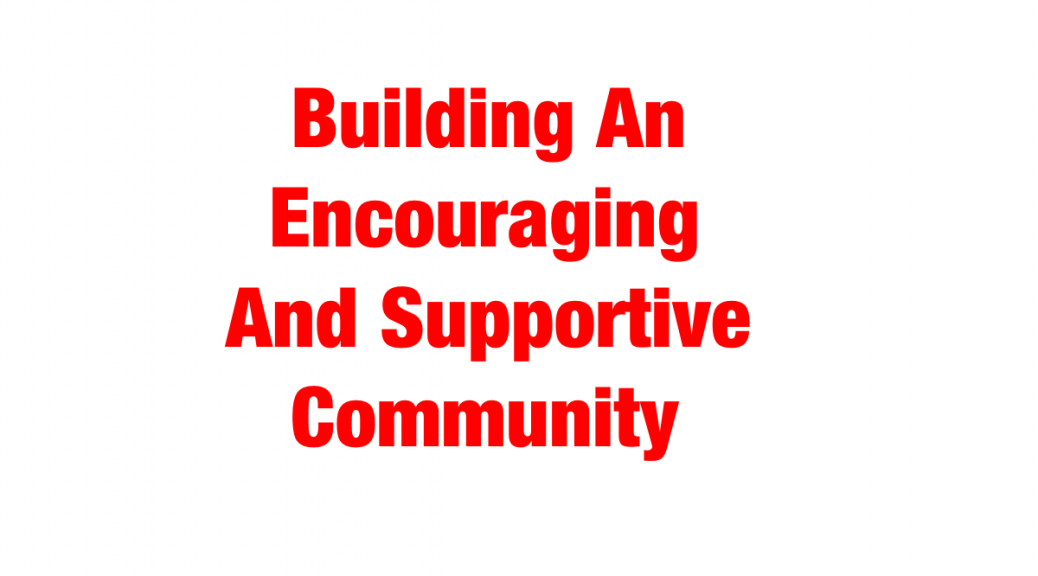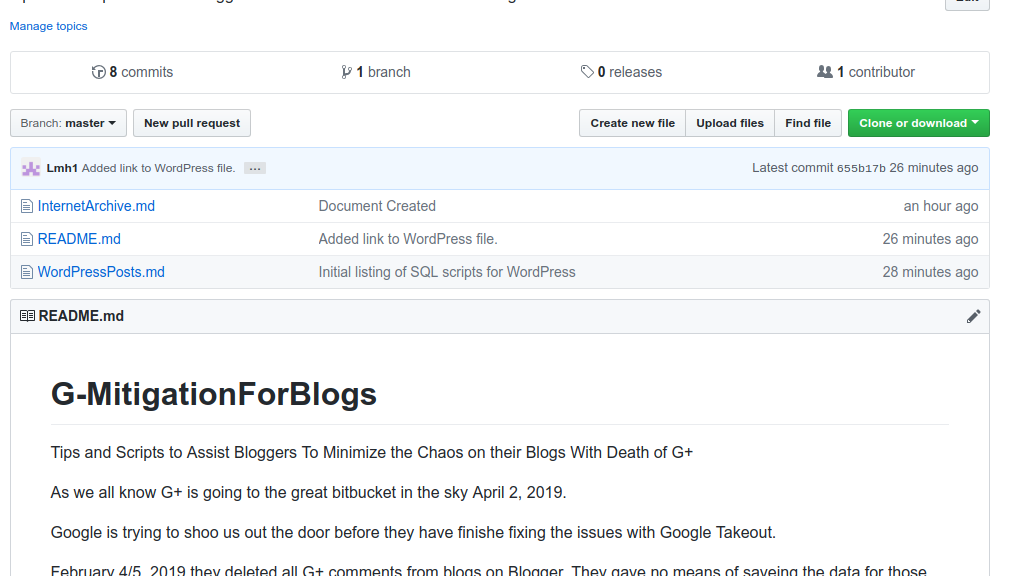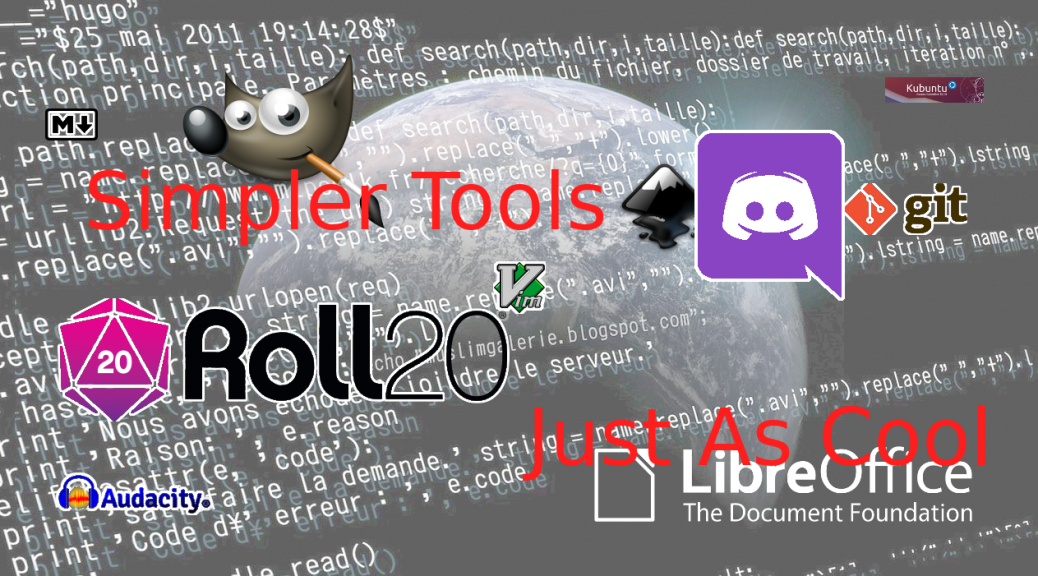As an RPG content producer, I’ve spent a lot of money on fancy tools, some that require more money when versions are updated, etc. Check out episode 77 of my podcast where I discuss this topic*.
Several years ago, I was very big into Linux and free and open source software. I’m still a proponent of free and open source software, I just had issues in the past finding Linux based solutions for some of my workflows.
I have a pretty powerful Windows 7 Pro desktop that I dual boot Linux Kubuntu. The same system flies on Linux. For example, I used Gimp for image editing. Gimp takes forever to load on Windows, yet opens quickly on Linux. On Linux it isn’t lightning fast, but it’s noticeably faster than on Windows. Also my C:\ drive, where Windows and most programs are installed is a solid state drive. Linux is on a partition of my hard drive.
I’m looking at going back to my roots in computing. By that I mean more plain text and more reliance on the keyboard rather than the mouse. I started with a TI-99 4/A when my Dad bought our first computer. All programming on BASIC was plain text. When I went to college, I studied computer science for the first three semesters and was in the first freshman class that did NOT have to use punch cards.
Way back in the mid 80’s I used WordStar a text based word processor with tabs for bold, underline, italics, etc. It was perfect for formatting any kind of paper I had to turn in in college.
VisiCalc, the first spreadsheet was a text based interface. I never used it, but saw plenty of people use it.
Later, in the mid 90’s I had what may have been the last DOS based version of MS-Word when my Dad got a new PC with Windows 3.0 and gave me his old one. I didn’t like the idea of a mouse back then, and have used one so long now that it’s second nature.
However, I’ve been doing some research on the tools I use for producing my content in all it’s forms. I’ve used Linux off and on for 15 years. Most of my work is done on Windows, but there are many programs that I use that are cross platform, like Libre Office, Gimp, Inkscape, Audacity, Discord, Chrome, and more.
I draft a lot in a text editor, NoteTab Pro, but it’s fancy GUI programmable text editor with lots of bells and whistles I have used for 20 years and an update for whatever comes after Windows 10 or the ability to work on it, may be lost. I have no way of knowing. There is no single tool that does all that this text editor can do, and I’ll never find it, short of learning to code and build my own text editor. Rather than invest that sort of time, I’m looking at finding tools with the power to do the jobs I need.
I’ve used the vim text editor off and on over the years, and it has a lot of power built in. It is the default text editor on many Linux distributions. Linux follows the Unix philosophy for programs, do one thing and do it well. The ability to send the output of one program to another allows one with the basic default tools in Linux to make scripts to do all the things you want or need to do. If there is a new computing challenge you need to overcome on Linux, you have a good shot of hacking a chain of scripts together to do what you want.
That all leads me to what my last week of research into topics parallel to my production of various RPG related content
In the past I’ve looked into moving to Linux to avoid the whole issue with Microsoft. I kept avoiding it because of my addiction to my favorite text editor, NoteTab Pro, that I’ve used nearly every day for 20 years. I take notes, draft games ideas, keep lists, campaign notes, adventure prep, and more. I’ve built thousands of little helper scripts that help me do my day job and also help me with personal tasks. I’m even credited in the help file as a beta tester, since I helped beta test so many updates over the years. I was very active on the mailing lists for at least a decade. I even started a mailing list for how to use it on Linux via Wine, so I can have it available until I figure out how to replace it.
This all started when I started digging in to Markdown, the text markup language used to change a text file into web pages, or more impressively, a PDF. The tools to do this are free. Right now, I’m using a $20 program, Serif Page Plus, that is not supported, and a very fancy replacement, Affinity Publisher, is in beta. I have no idea what it will cost, but it just keeps getting more and more bells and whistles. Markdown can’t do all I want to do, but I’m versed in mark up from the WordStar days back in the mid 80’s, and HTML in the late 90’s to present. All you need is a text editor, vim has syntax highlighting for it, so that’s a plus. Vim is also free. Pandoc the interpreter for converting Markdown to other formats is also free.
Markdown can’t do two column PDFs, which is what I have been producing so far, in all my PDFs. There are some clunky ways to get it to do that. But it can format tables and handle a lot of things.
For even more power, there is LaTeX, which has even more fancy formatting options and can do two column layout. There is even a LaTeX plugin called RPG module that someone designed to format a PDF like an old school module. While the level of formatting in it is not yet fully in my grasp, I am slowly getting there.
I found a great very fancy graphical editor, Texmaker, for working with LaTeX, and through YouTube, tons of videos by people showing how to do the basics and some more complex things.
Then I found a guy on YouTube who’s doing all his stuff on Linux via almost 100% terminal based programs. He even records video and audio with the same camera and microphone I use. All I need is an easy to use video editor, and I can probably move to Linux nearly full time. I have a couple of programs that are Windows only, and Wine does not support them, so some sort of Linux program to take their functionality needs to be located.
The internet runs on Linux, Microsoft is even doing things with Linux, and there are rumors it may add Linux to Windows.
- I have an Android phone which is based on linux.
- So I’ve already recorded episodes straight to my phone.
- Linux is based on unix
- Mac OS is based on unix.
- iPhone is also based on unix.
My prior efforts to move to Linux had lots of reasons not to. Programs have improved so much in the last several years, that it makes less and less sense for me to stick with Windows. This is especially true of consumers who only use their computers for the internet, email, social media, and office suite products. Linux is faster than Windows and you don’t need all the crap that most big name computer sellers throw on there. Viruses are less of an issue. Unless you have a very niche program that you have to use, there is little reason for most users to stick with Windows.
NOTE: Computer games tend to be one reason, many would stick with Windows. I’m not a computer gamer, as I lose track of time and I’m not productive if I get lost for hours on end.
The other reasons that I will need to dip into Windows for personal projects is for taxes. I haven’t researched lately, but last I checked about 7 or 8 years ago, there was no computer based tax software for Linux. Of course, one can use the online option many tax companies now offer.
Another is genealogy programs. I have a Windows based genealogy program called Legacy that has some helpful tools and I have a lot of data clean up to do before going with Linux. There is a great cross platform genealogy program with a Windows port, called LifeLines. Current development is here. It has a lot of power and flexibility.
Of course, the biggest reason I will keep using Windows every day is that’s what we have to use at work. However, many of the tools I use on Linux, I also can use on Windows. Since they’re free, and I don’t have a locked down laptop, I can install software that helps me get my job done.
I’m starting with trying to format the text of my first PDF to get it in to a two column layout and polished tables. The great thing is, I can make separate files for different pieces and call them as I need them. For example, the title page has very little that changes from one PDF to another, and the OGL only changes slightly in the last section where one credits other works and adds their new title. I’ve got lots of notes and ideas for how to improve my workflow. Trying to use a graphical editor to make it look like what I want it just a challenge. I’m going to dust off my general mark up skills and make something that looks better, and I can easily modify the look. I can also easily use the same source document to make web pages, PDF, or any other format I want or need.
I also have in mind to use GitHub for collaboration on projects. GitHub uses Git, which was written by Linus Torvalds, the guy who started and still oversees Linux development. I haven’t finalized anything, it is more of a long term project to dig into once I am producing my monthly PDFs totally via plain text with markup tags.
The looming demise of G+ and their announcement that all consumer G+ accounts will be deleted after April 2, 2019 has really driven home the point that I need to be more responsible with my data and present it on my blog and sites I control, and use social media to direct others back to my blog. I also know I need to revise the look of my blog, and I have lots of ideas for that.
I have 3 games to finish prepping for Marmalade Dog, here in Kalamazoo, MI in a couple of weeks, and three more games to prep for Gary Con. You can bet, I will be making those preparations in Linux so I maximize the proficiency of use of my new tools.
Above, I mentioned Discord. I have played in regular Roll20 games and used the Linux version of Discord and it works just like the Windows version.
Roll20, since it is browser based, works just fine on Linux.
If you don’t have any need for a program that is only Windows and it won’t run right via Wine, there is little need to stay on Windows. Linux is great for extending the life of old hardware. Since Linux is so fast, i.e. efficient, compared to Windows, it is a lot faster.
You can even download iso files of most Linux distributions and burn them to a CD, or put on a thumb drive to try them out. I’d recommend against dual booting as it limits the usefulness of your computer. If you really want to run Windows and Linux, I’d suggest installing Linux as the only OS on your system, and find a free virtual machine software, and install Windows to a virtual machine. That will give you access to your Windows based programs, and is even more secure as you can deny the virtual machine internet access.
*I recorded this episode via Linux using Audacity, which is the same program I use on Windows.






